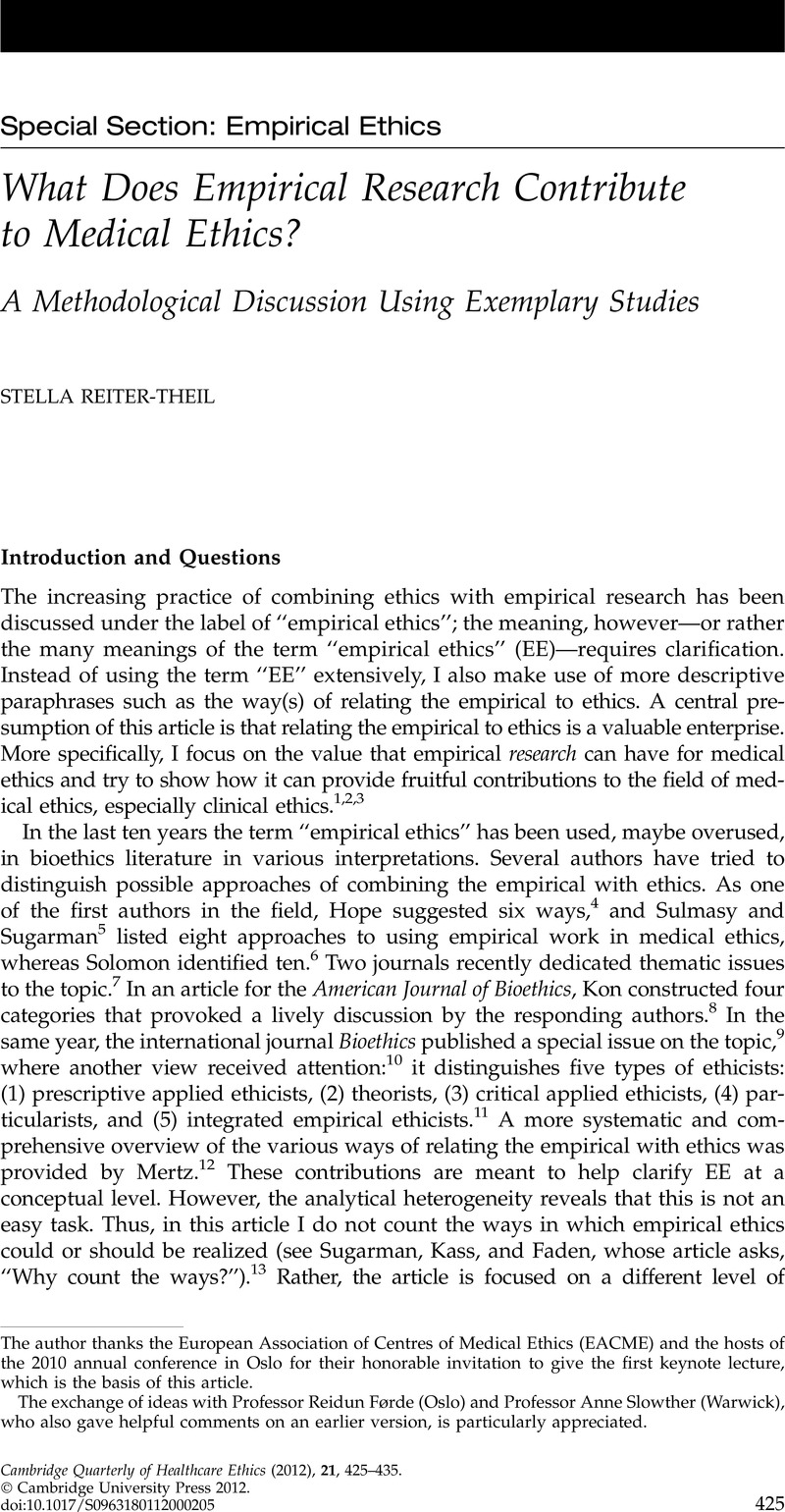A Methodological Discussion Using Exemplary Studies
Published online by Cambridge University Press: 24 July 2012

1. Reiter-Theil, S.Does empirical research make bioethics more relevant? “The embedded researcher” as a methodological approach. Medicine, Healthcare and Philosophy 2004;7(1):17–29.CrossRefGoogle Scholar
2. Førde, R.How can empirical ethics improve medical practice? Cambridge Quarterly of Healthcare Ethics 2012;21(4):517–526.CrossRefGoogle ScholarPubMed
3. Some authors use the term “EE” with a focus on practical work in clinical ethics, e.g., Widdershoven, G, Abma, T, Molewijk, B.Empirical ethics as dialogical practice. Bioethics 2009;23(4):236–48.CrossRefGoogle ScholarPubMed
4. Hope, T.Empirical medical ethics. Journal of Medical Ethics 1999;25(3):219–20.CrossRefGoogle ScholarPubMed
5. Sugarman, J, Sulmasy, DP. The many methods of medical ethics. In: Sugarman, J, Sulmasy, DP, eds. Methods in Medical Ethics. Washington, DC: Georgetown University Press; 2001:3–18.Google Scholar
6. Solomon, M.Realizing bioethics’ goals in practice: Ten ways “is” can help “ought.” Hastings Center Report 2005;35(4):40–7.CrossRefGoogle Scholar
7. Empirical ethics [special issue]. American Journal of Bioethics 2009;9(6–7). Empirical turn [special issue]. Bioethics 2009;23(4).Google Scholar
8. Kon, AA.The role of empirical research in bioethics. American Journal of Bioethics 2009;9(6–7):59–65.CrossRefGoogle ScholarPubMed
9. Empirical ethics [special issue]. Bioethics 2009;23(4).Google Scholar
10. Molewijk, B, Stiggelbout, AM, Otten, W, Dupuis, HM, Kievit, J. Empirical data and moral theory: A plea for integrated empirical ethics. Medicine, Healthcare and Philosophy 2004;7(1):55–69.CrossRefGoogle ScholarPubMed
11. As described by De Vries R. How can we help? From “sociology in” to “sociology of” bioethics. Journal of Law, Medicine & Ethics 2004;32(2):279–92.CrossRefGoogle Scholar
12. Mertz M. 2009. Zur Möglichkeit einer evidenzbasierten Klinischen Ethik: Philosophische Untersuchungen zur Verwendung von Empirie und Evidenz in der (Medizin-)Ethik [About the possibility of an evidence-based clinical ethics: Philosophical investigations about the use of the “empirical” and “evidence” in (medical) ethics] [master’s thesis]. Munich/Ravensburg: GRIN Verlag.
13. Sugarman, J, Kass, N, Faden, R.Categorizing empirical research in bioethics: Why count the ways? American Journal of Bioethics 2009;9(6–7):66–103.CrossRefGoogle ScholarPubMed
14. See note 12, Mertz 2009.
15. See note 1.
16. Research on clinical ethics and consultation [thematic section]. Medicine, Health Care and Philosophy 2008;11(1).
17. Pfaefflin, M, Kobert, K, Reiter-Theil, S.Evaluating clinical ethics consultation. Cambridge Quarterly of Healthcare Ethics 2009;18(4):406–19.CrossRefGoogle Scholar
18. Hentschel, R, Lindner, K, Krüger, M, Reiter-Theil, S.Restrictions of ongoing intensive care (RIC) in neonates—a prospective study. Pediatrics 2006;118:563–9.CrossRefGoogle Scholar
19. Forde, R, Hansen, TWR.Involving patients and relatives in a Norwegian clinical ethics committee: What have we learned? Clinical Ethics 2009;4:125–130.CrossRefGoogle Scholar
20. Faden, RR, Beauchamp, TL.A History and Theory of Informed Consent. New York: Oxford University Press; 1986.Google Scholar
21. Dalla-Vorgia, P, Mason, S, Megone, C, Allmark, P, Bratlid, B, Gill, AB, et al. . Obtaining informed consent for neonatal research. ADC Fetal & Neonatal Edition 2001;84:F70–F73.CrossRefGoogle Scholar
22. Hurst, S, Forde, R, Reiter-Theil, S, Perrier, A, Slowther, AM, Pegoraro, R, et al. . Physicians’ access to ethics support services in four European countries. Health Care Analysis 2007;15:321–35.CrossRefGoogle ScholarPubMed
23. Nuckton, TJ, List, ND.Age as a factor in critical care unit admissions. Archive of Internal Medicine 1995;155:1087–92.CrossRefGoogle ScholarPubMed
24. Callahan, D.Setting Limits: Medical Goals in an Aging Society. New York: Simon & Schuster; 1987.Google Scholar
25. Callahan, D. Aging and the allocation of resources. In: Oberender, P, ed. Alter und Gesundheit. Baden-Baden: Nomos; 1996:83–92.Google Scholar
26. The principle follows the tradition of Kant and is often attributed to Hans Albert: Albert, H.Treatise on Critical Reason. Princeton, NJ: Princeton University Press; 1985.CrossRefGoogle Scholar
27. After initial skeptical reactions, the National Medical Academy put the topic on its agenda.
28. Winkler, E, Reiter-Theil, S, Lange-Rieß, D, Schmahl-Menges, N, Hiddemann, W.Patient involvement in decisions to limit treatment: The crucial role of agreement between physician and patient. Journal of Clinical Oncology 2009;27(13):2225–30.CrossRefGoogle ScholarPubMed
29. Charles, CA, Gafni, A, Whelan, T, Willan, A, Farrell, S.Shared decision making: What does it mean to physicians? Journal of Clinical Oncology 2003;21:932–6.CrossRefGoogle Scholar
30. Charles, CA, Gafni, A, Whelan, T.Decision-making in the physician-patient encounter: Revisiting the shared treatment decision-making model. Social Science & Medicine 1999;49:651–61.CrossRefGoogle ScholarPubMed
31. “Dialectic,” according to Hegel, refers to the necessary process that makes up progress in both thought and the world. The process is one of overcoming the contradiction between thesis and antithesis, by means of synthesis; the synthesis in turn becomes contradicted, and the process continues (after Oxford Dictionary of Philosophy. Oxford: Oxford University Press; 1996).Google Scholar
32. Regulative idea, after Oxford Dictionary of Philosophy, see note 31.
33. Reidun Førde has pointed out this analogy, which deserves more exploration from both epistemological and ethical perspectives.
34. Reiter-Theil, S, Agich, GJ.Research on clinical ethics and consultation: Introduction to the thematic section. Medicine, Health Care and Philosophy 2008;11(1):3–5.CrossRefGoogle Scholar
35. METAP is an evidence-oriented guideline providing knowledge and procedures for clinical ethics support; the acronym stands for modular, ethical treatment decisions, allocation of resources at the micro level, and process.
36. Reiter-Theil, S, Mertz, M, Schürmann, J, Stingelin Giles, N, Meyer-Zehnder, B.Evidence - competence - discourse: The theoretical framework of the multi-centre clinical ethics support project METAP. Bioethics 2011;25(7):403–12.CrossRefGoogle ScholarPubMed